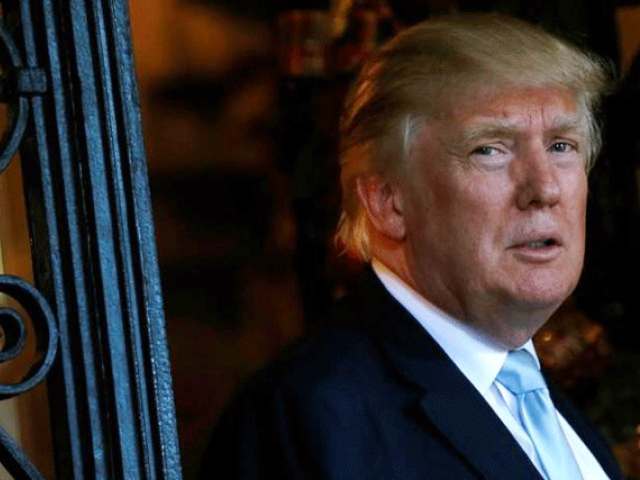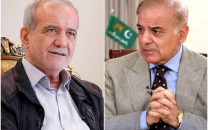After Trump’s diatribe, sensible approach needed to rescue economy
US may influence global institutions to stop disbursing billions to Pakistan

US may influence global institutions to stop disbursing billions to Pakistan. PHOTO: REUTERS
The way things are unfolding, the PML-N government could face suspension of conventional and commercial sources of foreign funding and the issue requires urgent policy action. The important question, however, is whether anybody in the government is realising that economic stranglehold by the superpower is around the corner.
The Trump administration has refused to release $225 million in economic assistance and there is no hope that it will disburse the remaining $4 billion that was to come through the Coalition Support Fund (CSF), which in fact is a reimbursement.
A total assistance of $33 billion offered over the past 17 years by the US includes $22 billion in security assistance and $11 billion in economic support. Serious implications of US policies, it is said, should not be ignored, especially when the World Bank, International Monetary Fund (IMF) and Asian Development Bank (ADB) would be influenced to stop disbursing $2.3 billion - $1.2 billion by the ADB, $1 billion by the International Development Association (IDA) – a concessionary window of the World Bank, and $0.1 billion by the IBRD.
Besides this, the Islamic Development Bank (IDB) could be pressurised through Bahrain to desist from disbursing $1.6 billion annual assistance to Pakistan. This is a short-term credit line made available over the years to meet Pakistan’s urgent financial needs. “This makes a total of $4 billion in annual assistance, which I am afraid could be withheld because of the new very hostile US policy towards Islamabad,” a former finance minister said.
“The problem is we have a very weak government and things are compounded when one does not find any governance,” he said while requesting anonymity.
There is no denying the fact that there is no direct impact of the halt to the US assistance as it has already gone down to $730 million annually and could be managed provided just 4% increase is achieved in the country’s exports, which otherwise continue to decline due to many reasons.
These include unavailability of surplus exportable goods, lack of value addition and diversification besides expensive gas and electricity for the industry.
IMF board meeting
The real test will come at the IMF executive board meeting in February when the post-programme monitoring mission of the fund will present its report about Pakistan. If Pakistan does not get a Letter of Comfort from the IMF due to US pressure, some new difficulties will emerge that warrants a viable strategy to deal with the issue.
The US government could also ask foreign commercial banks to squeeze their loan facility for Pakistan which will compound the financial and economic problems. The IMF’s executive board this time around may not be that helpful as was the case during the three-year $6.67 billion Extended Fund Facility (EFF) that ended in September 2016.
If both the performance criteria and structural benchmarks, related to reforms, were violated, could the IMF board remain quiet? Although Pakistan is no more under an IMF programme, its board, under pressure from the US, could differ on various issues that will not be good in order to obtain new loans from foreign commercial banks and investment companies.
Clean bill of health
Some officials, nevertheless, maintain that Pakistan had been meeting the performance criteria and that during three years of the IMF programme, the government implemented 51 structural benchmarks, including elimination of the SRO (Statutory Regulatory Order) regime, improved public debt management, rationalised gas and electricity tariffs and covered such sectors such as fiscal, monetary, banking and finance, trade and energy.
Then the government, they say, went for 22 legislations out of 51 structural benchmarks to meet the strict IMF performance criteria. Therefore, they are hopeful of having the clean bill of health from the IMF executive board about the economy.
Since the country is facing a new situation following Trump’s repeated warnings, these officials are, however, a little sceptical and are unprepared to comment about IFIs future attitude.
But government’s critics believe the country is left with one option – contacting China to pull through 2017-18 for which the government needs roughly $20 billion in financing.
Some officials maintain that there would be a requirement of $10 billion and not $20 billion, a claim rejected by independent economists.
Chinese, it is said, could be little forthcoming to provide any big credit line and if, at all, they decide, they would do that after having completed certain due diligence. China is already investing $60 billion in the prestigious China-Pakistan Economic Corridor (CPEC) and may feel “fatigued” to help overcome Pakistan’s serious balance of payments problem.
Paying lip service
One of the important things that need to be urgently done is to control rising imports that have gone beyond $50 billion compared to $20 billion worth of exports. There is also a question whether the current exchange rate would be further cut down to boost exports.
Those who know the issue say exports will not increase just by paying lip service or by providing over Rs200 billion in sales tax refunds to the exporters. The much-trumpeted Rs180-billion export package did not do any trick to increase exports as the bulk of the money is yet to be disbursed by the government. Moreover, there is no focus on how to enhance the country’s competitiveness for which both the government and exporters are equally to be blamed. While the central bank is failing to ensure some effective exchange rate mechanism to discourage speculative tendencies, exporters continue to avoid value addition.
Going forward, the government will have to find out some middle way to avoid severing relations with the US. It was a sensible decision by the cabinet and the National Security Committee to avoid any instant reaction over Trump’s diatribes who seems to be pushing his anti-Pakistan agenda including by taking into confidence the members of Congress.
The debt trap is getting too serious and it is time to manage relations with the US which is in a position to restrict us through IFIs, let alone doing anything on its own. Pakistan’s over $300-billion economy has to be rescued not just by rhetoric but through a sensible approach towards external affairs.
The writer is the recipient of four national APNS awards
Published in The Express Tribune, January 8th, 2018.
Like Business on Facebook, follow @TribuneBiz on Twitter to stay informed and join in the conversation.



















COMMENTS
Comments are moderated and generally will be posted if they are on-topic and not abusive.
For more information, please see our Comments FAQ